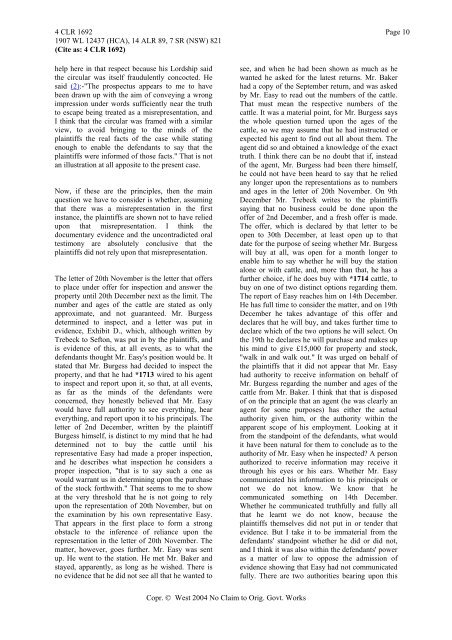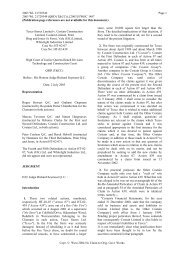Holmes v Jones - Thomson Reuters
Holmes v Jones - Thomson Reuters
Holmes v Jones - Thomson Reuters
- No tags were found...
Create successful ePaper yourself
Turn your PDF publications into a flip-book with our unique Google optimized e-Paper software.
4 CLR 1692 Page 101907 WL 12437 (HCA), 14 ALR 89, 7 SR (NSW) 821(Cite as: 4 CLR 1692)help here in that respect because his Lordship saidthe circular was itself fraudulently concocted. Hesaid (2):-"The prospectus appears to me to havebeen drawn up with the aim of conveying a wrongimpression under words sufficiently near the truthto escape being treated as a misrepresentation, andI think that the circular was framed with a similarview, to avoid bringing to the minds of theplaintiffs the real facts of the case while statingenough to enable the defendants to say that theplaintiffs were informed of those facts." That is notan illustration at all apposite to the present case.Now, if these are the principles, then the mainquestion we have to consider is whether, assumingthat there was a misrepresentation in the firstinstance, the plaintiffs are shown not to have reliedupon that misrepresentation. I think thedocumentary evidence and the uncontradicted oraltestimony are absolutely conclusive that theplaintiffs did not rely upon that misrepresentation.The letter of 20th November is the letter that offersto place under offer for inspection and answer theproperty until 20th December next as the limit. Thenumber and ages of the cattle are stated as onlyapproximate, and not guaranteed. Mr. Burgessdetermined to inspect, and a letter was put inevidence, Exhibit D., which, although written byTrebeck to Sefton, was put in by the plaintiffs, andis evidence of this, at all events, as to what thedefendants thought Mr. Easy's position would be. Itstated that Mr. Burgess had decided to inspect theproperty, and that he had *1713 wired to his agentto inspect and report upon it, so that, at all events,as far as the minds of the defendants wereconcerned, they honestly believed that Mr. Easywould have full authority to see everything, heareverything, and report upon it to his principals. Theletter of 2nd December, written by the plaintiffBurgess himself, is distinct to my mind that he haddetermined not to buy the cattle until hisrepresentative Easy had made a proper inspection,and he describes what inspection he considers aproper inspection, "that is to say such a one aswould warrant us in determining upon the purchaseof the stock forthwith." That seems to me to showat the very threshold that he is not going to relyupon the representation of 20th November, but onthe examination by his own representative Easy.That appears in the first place to form a strongobstacle to the inference of reliance upon therepresentation in the letter of 20th November. Thematter, however, goes further. Mr. Easy was sentup. He went to the station. He met Mr. Baker andstayed, apparently, as long as he wished. There isno evidence that he did not see all that he wanted tosee, and when he had been shown as much as hewanted he asked for the latest returns. Mr. Bakerhad a copy of the September return, and was askedby Mr. Easy to read out the numbers of the cattle.That must mean the respective numbers of thecattle. It was a material point, for Mr. Burgess saysthe whole question turned upon the ages of thecattle, so we may assume that he had instructed orexpected his agent to find out all about them. Theagent did so and obtained a knowledge of the exacttruth. I think there can be no doubt that if, insteadof the agent, Mr. Burgess had been there himself,he could not have been heard to say that he reliedany longer upon the representations as to numbersand ages in the letter of 20th November. On 9thDecember Mr. Trebeck writes to the plaintiffssaying that no business could be done upon theoffer of 2nd December, and a fresh offer is made.The offer, which is declared by that letter to beopen to 30th December, at least open up to thatdate for the purpose of seeing whether Mr. Burgesswill buy at all, was open for a month longer toenable him to say whether he will buy the stationalone or with cattle, and, more than that, he has afurther choice, if he does buy with *1714 cattle, tobuy on one of two distinct options regarding them.The report of Easy reaches him on 14th December.He has full time to consider the matter, and on 19thDecember he takes advantage of this offer anddeclares that he will buy, and takes further time todeclare which of the two options he will select. Onthe 19th he declares he will purchase and makes uphis mind to give £15,000 for property and stock,"walk in and walk out." It was urged on behalf ofthe plaintiffs that it did not appear that Mr. Easyhad authority to receive information on behalf ofMr. Burgess regarding the number and ages of thecattle from Mr. Baker. I think that that is disposedof on the principle that an agent (he was clearly anagent for some purposes) has either the actualauthority given him, or the authority within theapparent scope of his employment. Looking at itfrom the standpoint of the defendants, what wouldit have been natural for them to conclude as to theauthority of Mr. Easy when he inspected? A personauthorized to receive information may receive itthrough his eyes or his ears. Whether Mr. Easycommunicated his information to his principals ornot we do not know. We know that hecommunicated something on 14th December.Whether he communicated truthfully and fully allthat he learnt we do not know, because theplaintiffs themselves did not put in or tender thatevidence. But I take it to be immaterial from thedefendants' standpoint whether he did or did not,and I think it was also within the defendants' poweras a matter of law to oppose the admission ofevidence showing that Easy had not communicatedfully. There are two authorities bearing upon thisCopr. © West 2004 No Claim to Orig. Govt. Works
















